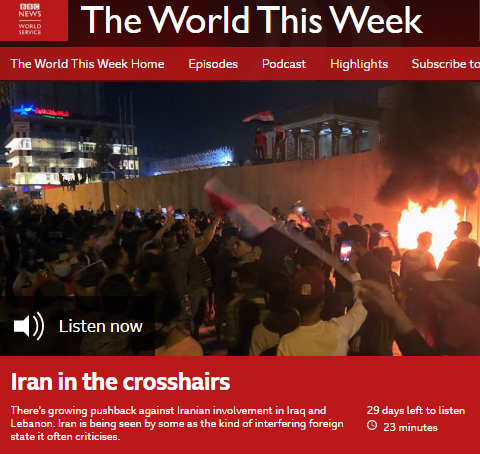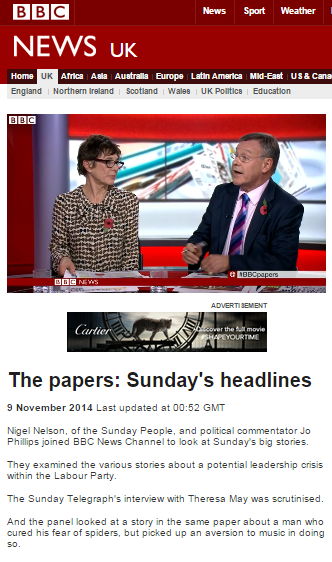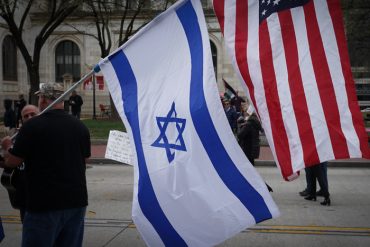Earlier this month we noted that an article written by the BBC’s Middle East editor on the subject of the demonstrations in Iraq and Lebanon had avoided the issue of protests against Iranian intervention in those countries.
An item aired in the November 9th edition of the BBC World Service radio programme ‘The World This Week’ – titled “Iran in the crosshairs” – did relate to that issue, but from a remarkable viewpoint.
“There’s growing pushback against Iranian involvement in Iraq and Lebanon. Iran is being seen by some as the kind of interfering foreign state it often criticises.”
Presenter Caroline Wyatt introduced that lead item with the erroneous claim that Iran had fulfilled its JCPOA obligations concerning the Fordow nuclear plant. [emphasis in italics in the original, emphasis in bold added]
Wyatt: “Iran turned the nuclear screw this week, bringing back into operation nuclear equipment it shut down under the terms of the nuclear deal agreed with Western powers in 2015 but which President Trump later walked away from. But was this a warning or a sign of weakness? The security think tank the International Institute for Strategic Studies in London said this week that Iran was winning the struggle for strategic influence in the Middle East. But is that starting to change? Protests in Lebanon and Iraq against their political elites have focused much of their criticism on Iran with the Iranian consulate in the Iraqi city of Karbala coming under attack. So I asked Kasra Naji of BBC Persian how worried is Iran that it may now be in the process of losing the power and influence it’s acquired in Iraq and Lebanon.”
That IISS report was the subject of an article which appeared on the BBC News website on November 7th.
Kasra Naji gave listeners a highly sanitised view of the Iranian regime’s decades-old activities in other countries.
Naji: “Well I think Iran is very worried. I think Iran is concerned particularly about what’s going on in Iraq. Iraq is next door and the demands of those people on the streets of Baghdad and other cities in Iraq are not all that different to the demands of the Iranians within Iran. It could easily come this side of the border so they’re watchful of that. Over the years since the toppling of Saddam Hussein in 2003 Iran has invested heavily in setting up political parties, militias, its proxies, its political influence and that is suddenly in danger. If not danger, the prestige of Iran in the region and in Iraq is under serious question today and that doesn’t look good for Iran at all. And in Lebanon also Hizballah has been a major component of Iran’s influence in the region. Iran looks at southern Lebanon as basically a province of Iran. And they don’t want to see that coming under threat.”
Remarkably, neither Wyatt nor Naji bothered to explain to listeners what “the demands of those people on the streets” actually are. Neither did they make any effort to inform audiences even in passing that over 300 Iraqi protesters are reported to have been killed by security forces which allegedly include Iranian-backed militias and that rather than merely ‘worrying’ about the situation in Iraq as suggested by Naji, the Iranian regime is taking an active role in events there.
Both Wyatt and Naji seemed intent on framing objections to Iranian intervention in neighbouring countries as something recent.
Wyatt: “According to one commentator in Iraq, the shoes are out again so the public discontent is growing. Isn’t Iran now in danger of being seen as just the kind of regime that it likes to criticise?”
Naji: “That’s right. That’s another danger of all this. Iran is suddenly seen as a usurping power, a foreign power trying to influence events within those countries, particularly within Iraq.”
After an equally superficial discussion of Iran’s involvement in Syria, the conversation turned to Iran’s recent nuclear activities with Wyatt asking “so why is it continuing to risk more sanctions?”.
Naji: “Because it doesn’t have any other choice. It’s come under heavy pressure of US sanctions and they are crippling Iran’s economy. […] So what they’re trying to do is to put pressure on the Europeans particularly and say ‘listen, if you don’t come up and save this deal and do your part of the deal – your commitments in the deal – then there’s no point in staying in this agreement. It’s a cry for help. It’s like saying that we cannot continue like this; come and help us, save this deal, otherwise this deal is going to collapse.”
BBC World Service listeners were not informed what those allegedly unfulfilled European “commitments” supposedly entail before Wyatt closed with a final question about the opinions of “ordinary Iranians” on the nuclear issue and Naji’s reply failing to inform audiences that those opinions carry little weight as far as the Iranian regime is concerned.
Obviously this item presented BBC audiences with a decidedly one-sided view of the story which focused on framing Iran as being “in the crosshairs” rather than the Lebanese and Iraqi people actually being attacked by its proxy militias on the streets of Beirut and Baghdad.
Related Articles:
BBC News mantra on ‘peaceful’ Iranian nuclear programme returns




